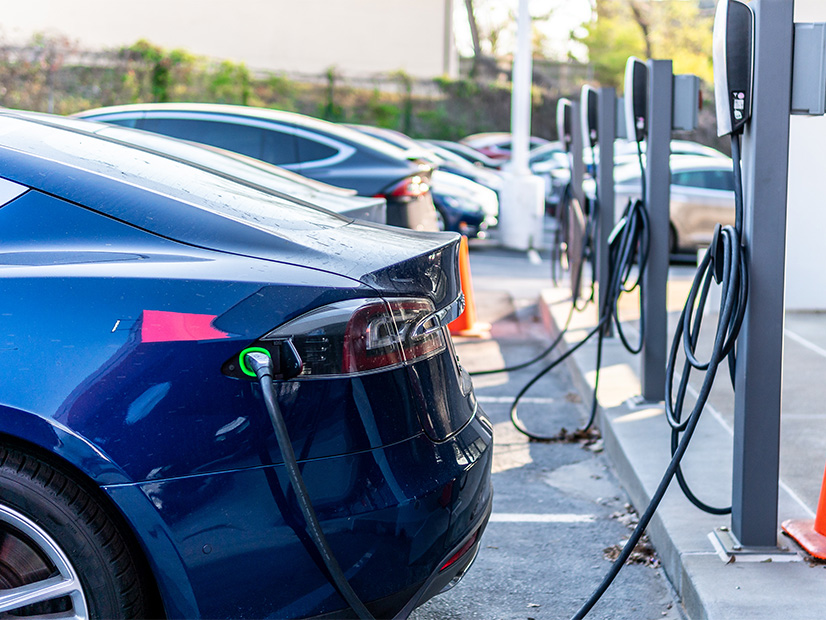New Jersey Gov. Phil Murphy (D) said Nov. 21 that the state has adopted the Advanced Clean Cars II rule effective Dec. 18, sparking relief from supporters who pushed for it to be ready for the 2027 model year and disquiet from business groups who say it will make vehicles more expensive.
Murphy said the move to adopt the rule, which was first crafted and adopted by the California Air Resources Board, would put the state on a “road toward better air quality and cleaner choices for new car buyers while combating the worsening climate crisis.”
A prepublication copy of the rule will be posted in early December to the Department of Environmental Protection’s Rules and Regulations webpage.
New Jersey is the ninth state to adopt the rule, which will require all new light-duty vehicles sold in the state to be zero emission by 2035. Combined, the state adoptions mean that by the end of 2035, 28.5% of the sales of new light vehicles in the U.S. would have to be zero-emission vehicles (ZEVs), according to a tracking list put together by the Sierra Club.
The rule requires manufacturers to make ZEVs a steadily increasing portion of their car sales, starting with 35% for model year 2026, increasing to 68% in 2030 and reaching 100% in 2035. It defines ZEVs as battery-electric, hydrogen fuel cell or plug-in hybrid. The rule also includes increasingly stringent low-emission vehicle standards aimed at reducing tailpipe emissions of gasoline-powered cars and heavier passenger trucks.
Urban Benefits
Murphy announced his decision in a release containing quotes supporting the move from several environmental and pro-EV groups and the mayors of four urban communities in the state — Newark, Plainfield, Passaic and Trenton — who said rule would help combat emissions from the heavy traffic in the state.
“As the largest automobile transportation hub and energy generation center in the state, Newark has much to gain through this rule,” Mayor Ras Baraka said. The rule will mean “greater investment into ZEVs, more jobs for city residents and more availability of these vehicles for motorists.”
Transportation is the largest source of emissions in the state, generating about 37% of the emissions, and supporters of ACC II contend that the state needs tough requirements to accelerate the uptake of EVs and dramatically curb emissions. They say that more moderate programs such as offering incentives won’t stimulate enough purchases and don’t provide the certainty of the state’s commitment that the ACC II rule does.
“By accelerating the growth of the EV market, ACC II will spur continued investment and innovation in the transition to a clean energy transportation sector,” said Richard Lawton, executive director of the NJ Sustainable Business Council.
Price Hikes
The New Jersey Business and Industry Association (NJBIA), which led a campaign against the rule, called it an “unworkable mandate,” adopted over the opposition of more than 100 business and labor groups and thousands of people. (See NJ Businesses Demand Halt to EV Sales Promotion Rules.)
Ray Cantor, a lobbyist for the NJBIA, said the state does not have the charging infrastructure to support a sudden, massive uptake of EVs. He added that because EVs are still much more expensive than gas vehicles, the sudden surge in sales requirements would result in consumers looking for lower-priced used vehicles, pushing the price up.
“At the end of the day, the DEP did not heed any of those concerns, nor did it offer any solutions to them,” he said. “This ban of the sale of new gas-powered cars, in such an expedited time, does not take costs or feasibility into account. It does not take the lack of local and highway infrastructure into account. It does not take grid capacity into account. It ignores consumer choice. It doesn’t take New Jersey residents into account, especially low- and moderate-income families. And it doesn’t take the lack of actual environmental benefit into account.”
Incentive Program Closure
State officials say New Jersey has more than 123,000 electric vehicles on the road, representing 12% of new vehicle sales. Since just last December, sales of EVs have surged 50%, according to the state.
But that is a tiny portion of the estimated 6 million light-duty vehicles registered in the state.
The New Jersey Coalition of Automotive Retailers says that to increase EV sales volumes, the sector needs to bring the vehicle price down and make more charging stations available, which would help consumers overcome range anxiety.
To combat those concerns, state agencies have created a variety of programs to provide vehicle subsidies that bring the cost of an EV closer to that of a gas vehicle and help pay for the installation of charging infrastructure. The Board of Public Utilities said Nov. 20 that it is closing the fourth year of its Charge Up New Jersey program because the funds had been exhausted. The program had awarded $30 million since it opened on July 12, the BPU said.
The Charge Up New Jersey program, which offers subsidies of up to $4,000 for the purchase of an EV, has awarded $120 million over four years and funded the purchase of 35,000 vehicles.
The agency said it expects the fifth year of the program to open in July 2024.



